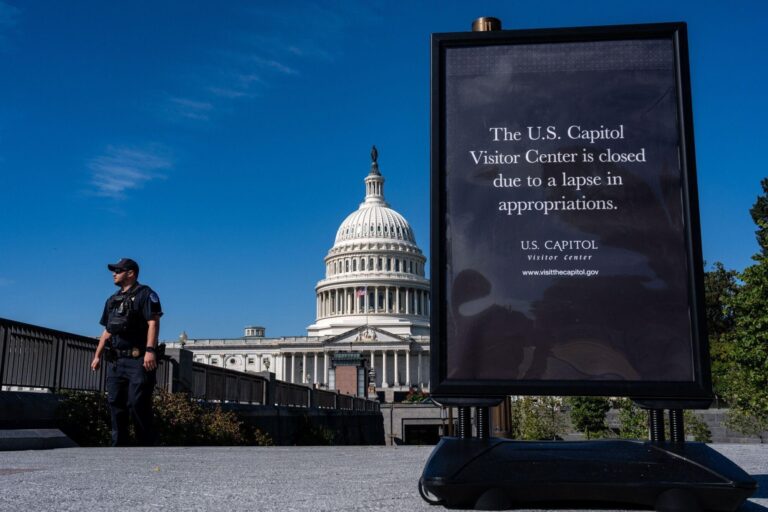Understanding the U.S. Government Shutdown: Effects on Federal Services and Local Communities
Federal Operations Halt: What the Shutdown Means for Public Services
The recent cessation of federal government activities has triggered widespread interruptions in numerous public services, impacting millions of Americans. Key agencies, including the National Park Service and the Food and Drug Administration, have curtailed or paused their operations, resulting in the closure of national parks and delays in critical food and drug safety inspections. These disruptions create challenges for citizens who depend on these services, as many federal employees face furloughs and limited operational capacity.
Major service interruptions include:
- Suspension of non-essential government functions and slower administrative processing
- Delays in federal benefit payments such as Social Security and veteransŌĆÖ aid
- Backlogs in passport and visa processing, affecting travel plans
- Reduced capacity for public health surveillance and emergency response
| Service | Effect | Expected Duration |
|---|---|---|
| National Parks | Closed or limited access for visitors | Several days to multiple weeks |
| Social Security Administration | Delays in benefit distribution and application processing | 1 to 2 weeks |
| Food and Drug Administration | Reduced inspections and oversight | Indeterminate |
Social Security and Federal Paychecks: Navigating Financial Uncertainty
While Social Security payments are classified as essential and typically continue during shutdowns, delays in processing new claims or issuing replacement cards are common. This can create difficulties for beneficiaries who rely on timely payments, especially seniors and individuals with disabilities. It is advisable for recipients to keep their documentation current and avoid last-minute requests to minimize disruptions.
Federal employees face more immediate financial challenges. Many are furloughed without pay during the shutdown, which can cause significant hardship. Although Congress often authorizes retroactive pay once the government reopens, the interim period can strain household budgets.
- Furloughed workers do not receive paychecks until government operations resume.
- Essential staff may be required to work without immediate compensation.
- Local economies that depend on federal salaries may experience downturns.
| Group | Shutdown Impact |
|---|---|
| Social Security Beneficiaries | Payments continue; new claims delayed |
| Federal Employees | Furloughs and postponed paychecks |
| Essential Personnel | Work without immediate pay |
Local Impact: How PhiladelphiaŌĆÖs Communities and Businesses Are Affected
PhiladelphiaŌĆÖs economy is likely to feel the immediate effects of the federal shutdown. Community programs funded by government grantsŌĆösuch as public health services, senior care, and educational outreachŌĆömay experience funding delays or cutbacks, disproportionately affecting vulnerable groups. Small businesses reliant on federal contracts or payments could face cash flow interruptions, which may lead to job losses and supply chain disruptions.
The tourism and hospitality industries are also at risk. With national landmarks and museums potentially closed or operating with reduced staff, visitor numbers may decline, impacting hotels, restaurants, and retail outlets. Additionally, federal services like airport security could face staffing shortages, resulting in longer wait times and inconveniences for travelers. Below is a summary of sectors and their potential challenges:
| Sector | Possible Consequences |
|---|---|
| Community Programs | Funding delays and service interruptions |
| Small Businesses | Delayed payments and cash flow problems |
| Tourism & Hospitality | Lower visitor turnout and longer security lines |
| Transportation | Staffing shortages affecting security and operations |
- Healthcare providers connected to federal programs may experience slower reimbursements.
- Local vendors supplying government contracts could face payment delays.
- Residents depending on federal assistance programs like SNAP and housing aid may encounter uncertainty.
Practical Tips for Financial Preparedness and Accessing Vital Support
Proactive financial planning is essential during a government shutdown to mitigate its impact. Begin by evaluating your budget and cutting back on non-essential spending. Aim to save enough to cover at least one monthŌĆÖs worth of critical expenses such as housing, utilities, food, and transportation. Building a cash reserve can help cushion the blow from delayed paychecks or interruptions in federal benefits. Where possible, consider consolidating debts or negotiating payment deferrals to ease financial pressure.
It is equally important to identify alternative support systems that remain operational despite federal funding pauses. Local food banks, state unemployment offices, and utility assistance programs often continue to provide aid. Below is a guide to key resources and how to access them:
| Resource | Access Method | Important Notes |
|---|---|---|
| Food Banks | Reach out to local community centers or search online directories | Supply may be limited during shutdown periods |
| State Unemployment Benefits | Apply via state websites or phone hotlines | Benefits typically continue; verify current status |
| Utility Assistance Programs | Contact utility providers to inquire about hardship plans | Some providers offer deferred payment options |
| Healthcare Services | Visit federally qualified health centers or community clinics | Check eligibility and availability before visiting |
Final Thoughts: Staying Informed and Prepared Amid the Shutdown
The ongoing U.S. government shutdown is poised to affect federal services and economic stability across the nation, with PhiladelphiaŌĆÖs residents and businesses feeling the ripple effects. Interruptions in government programs, delays in public services, and uncertainty in sectors reliant on federal funding are likely to persist until a resolution is reached. Staying updated through trusted news outlets and preparing financially can help individuals and families navigate this challenging period. The coming weeks will reveal the full scope of the shutdownŌĆÖs impact on daily life and community well-being.








